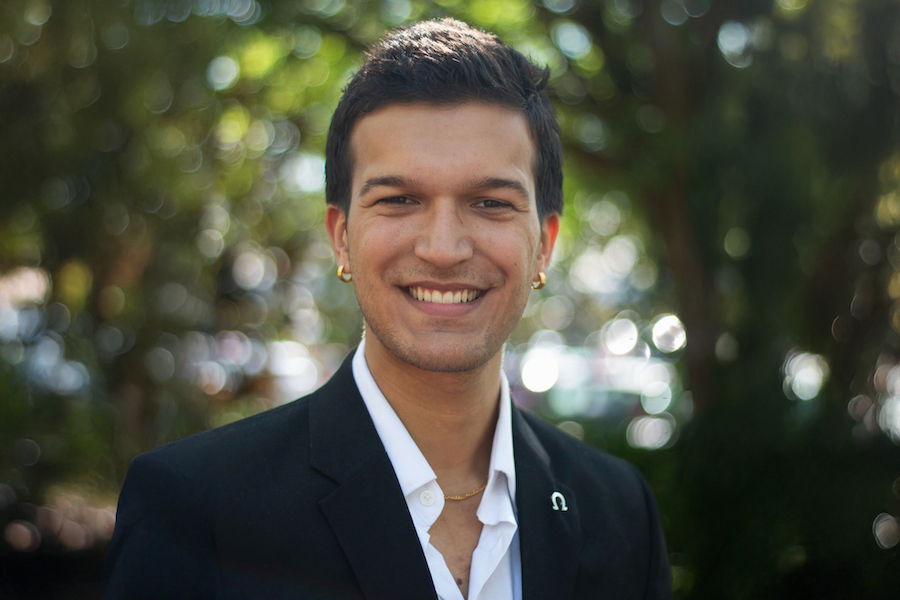Student Spotlight: Sean Faletti

Sean Faletti is a senior at Florida State University pursuing dual degrees in creative writing through the Department of English and human rights and social justice through the Department of Religion, both part of the College of Arts and Sciences. Faletti was among 30 first-year students selected in 2021 for the Presidential Scholars Program, FSU’s preeminent merit scholarship that invests in undergraduate students with extraordinary potential to be transformational leaders. He is completing an Honors in the Major thesis on Asian American coming-of-age narratives and has served in several leadership positions for the Student Government Association. Faletti was also selected by the FSU Alumni Association for the 2024 Homecoming Court, and he plans to graduate in Spring 2025.
Where are you from, and what brought you to FSU?
I’m originally from Orlando, Florida. Tallahassee felt like the perfect fit. I love FSU’s beautiful campus, and being just four hours from home provided the right balance of independence and proximity for weekend visits. Also, being accepted into the Presidential Scholars Program was an incredible opportunity I couldn’t pass up.
What inspired you to pursue a dual degree?
When I started college, my focus was solely on songwriting. I pursued creative writing to refine my skills as a songwriter and performer, recognizing that song lyrics are a form of poetry. As I became more involved in academics and organizations like the Asian American Student Union, I discovered a passion for protest art and its ability to influence social justice movements. Adding a degree in human rights and social justice broadened my understanding of societal dynamics and the transformative power of art, writing, and music in driving meaningful change.
Can you tell us about your research?
Through the Undergraduate Research Opportunity Program, I compared films from different cultures and examined their unique perspectives. I’m also passionate about Asian-American literature and recently started a year-long project for my Honors in the Major thesis under Distinguished University Scholar Barbara Hamby. My project focuses on the “Künstlerroman,” a German term for narratives about an artist’s personal and creative growth. I interview Asian-American artists and write poems inspired by their stories. These forms of literature and film are often overlooked in the American curriculum, but they address important international issues and experiences.
What do you want the public to know about your research? Why are your topics important?
I want people to reflect on the role of the arts in raising awareness and sharing underrepresented stories. We’re constantly surrounded by music, movies and TV, but we don’t always stop to think deeply about the stories they tell. Watching or reading media from marginalized communities is especially important because these stories often go unnoticed. It’s about fostering new perspectives and greater appreciation for voices that also deserve to be heard.
Tell us more about your experience in the Presidential Scholars Program.
The program is more than just a scholarship — it’s a community. We work on public-service initiatives, and I’ve been fortunate to meet some of my closest friends through the program, which has helped me grow as both a leader and a person. Last year, I served as our class representative. What I love most is how we come from different parts of campus, and when we reconnect, it highlights everything FSU has to offer.
Can you tell us about your involvement in the Asian American Student Union and South Asian Student Association?
AASU serves as an umbrella organization overseeing various affiliated groups. As someone of mixed heritage with an Indian mother and a white father, I joined to reconnect with my roots. My journey began as a volunteer performer at AASU events and culminated by serving as director from Fall 2023 to Spring 2024, simultaneously serving as SASA's president and now senior adviser. Initially, I struggled with not knowing much about my culture. While I brought passion and dedication, I had to step back, listen, and learn from my executive team and members who knew more. This experience taught me that leadership means being open to learning and valuing others’ knowledge. These experiences helped me embrace my identity, build friendships and foster cultural connections.
What’s been your most rewarding experience at FSU?
Growing as a mentor and fulfilling my goal of supporting others has been the most rewarding experience. Across the communities I'm involved in — including my fraternity, Lambda Phi Epsilon — mentorship has always played a vital role. Older students with more experience or deeper campus engagement support younger students, helping them grow and develop. It’s incredibly rewarding to see students step into leadership roles and carry on the legacies of past leaders.
What are some current goals/projects that you’re working on?
Recently, I’ve stepped back from some leadership roles, which has given me the chance to reconnect with performing, a passion that’s incredibly meaningful to me. One of my personal goals is to play more gigs with my band, "Hey Cheetah." We performed at Club Downunder last semester, and that experience was amazing. I’m excited to find more chances to share that energy with an audience and keep writing music.
Are there any faculty or staff members that have helped or inspired you?
Craig Filar, associate dean of undergraduate studies, director of the Office of National Fellowships, interim director of the University Honors Program, and faculty director of the Presidential Scholars Program, has been an invaluable mentor. I often meet with him for advice, which greatly shapes my direction. Honors Program teaching faculty Christina Owens was my research mentor and provided invaluable support. Lastly, associate professor of religion Nicole Kelley gave great advice and inspired me to seriously consider graduate school.
What advice would you give to other students?
Don’t stress too much about who you think you should be. I used to struggle with feeling like I had to follow a specific path. The truth is, there’s no single shape to who we’re supposed to be — it’s about who we have the potential to become.
